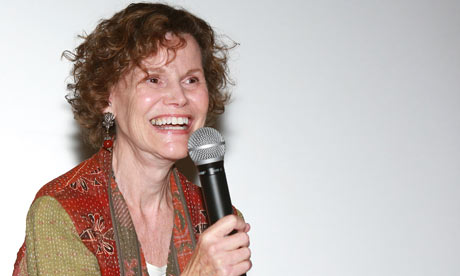
People! Lena Dunham has interviewed Judy Blume, the novelist, across 80 pages of a special edition of the Believer, to be released to subscribers at the end of the year. I don't know what this does to your brain, but it triggers short-circuits in mine, throwing together Blume's iconic rendition of young adulthood with its modern successor in a way the space/time continuum shouldn't permit.
The women are separated by two generations (Dunham is 27, Blume 75) and, judging by the excerpt, have much of interest to discuss about the creative process, etc. To the large constituency familiar with both women's work, however, there is only one question: which is ruder, Girls or Forever?
It's a trick question, of course. For those graduates of the Judy Blume school of informal sex education, nothing will ever be ruder than Forever…, a novel aimed at 15-year-olds, but which inevitably found its way into one's hands five years early and made a profound impression – not least because it came from the writer who'd just given us years of innocent delight with Superfudge, Sheila the Great and Peter Hatcher and his turtle.
Women in their 20s, 30s and 40s can still be made to change colour at mention of the name Ralph and his (its?) encounter with a palmful of au de cologne. I'd elucidate further but it feels like breaking a code. There are things understood but that cannot be spoken.
Incredibly, Forever was published in 1975, five years after Blume's most successful novel, Are You There God? It's Me, Margaret, which continues to be used as a cultural touchstone, most recently by
Chelsea Handler, and which illustrates how the books of one's childhood knit into memory as clearly as actual events, at a time when the membrane between the real and imagined is thinner.
It also makes a point about modernity. I read Are You There God? 15 years after it was published, but think of it as a novel specific to my era. More incredibly, Blume's 1977 novel, Starring Sally J Freedman as herself, the most autobiographical of her books, is actually set in 1947. I vaguely recall references to Hitler in the novel, but at the time and in my memory, it is as modern a rendition of a child's interior life as the most contemporary story.
Girls, Lena Dunham's HBO show, is not aimed at children, although it does animate a peculiar feature of modern life – the extended adolescence. We are forever being told that tweens and teenagers are much older and more sophisticated than their equivalents 25 years ago, but they are also targeted by highly age-specific marketing that is vaguely infantilising compared to the broader categories of yore. Revisit old children's books today and one is struck by how brutal they are compared to a lot of sanitized products made specifically for tweens.
Judy Blume has sold a reported 80m copies worldwide and her enduring appeal is marked by the reissue of her books next year with new jackets, designed to tweak the interest of an age group that wasn't even identified as a demographic in the '70s and '80s. Purists will cringe; the old covers of mostly hand-drawn artwork have been replaced with the slightly porny images that signal the over-involvement of the marketing department: two backlit heads nuzzling and the woman-jumping-in-sunlight motif, which is commercial shorthand for some mysterious aspect of ladies' personal development.
I have no desire to go back and reread them. Tampering with the airlock on a memory can be perilous. What if they're terrible? (I know they're not terrible). Even following Judy Blume on Twitter is a bit much. She's not supposed to be an actual person, with variable responses to things. She is a fixed star in the sky and she is mine, all mine.
Besides, in this age of social media throwing up old school friends so that no memory is safe from revision, it's nice to keep the blade sharp on a few recollections: of how Tales of A Fourth Grade Nothing got me through the misery of Brownie Camp in 1986. Of Deenie punching her fist through the wall; of Sheila the Great and her hives. Of Farley Drexel Hatcher banging pots under the table and swallowing his brother's turtle. Of the adventures of Ralph. Hats off to Judy Blume, I'm actually blushing.

